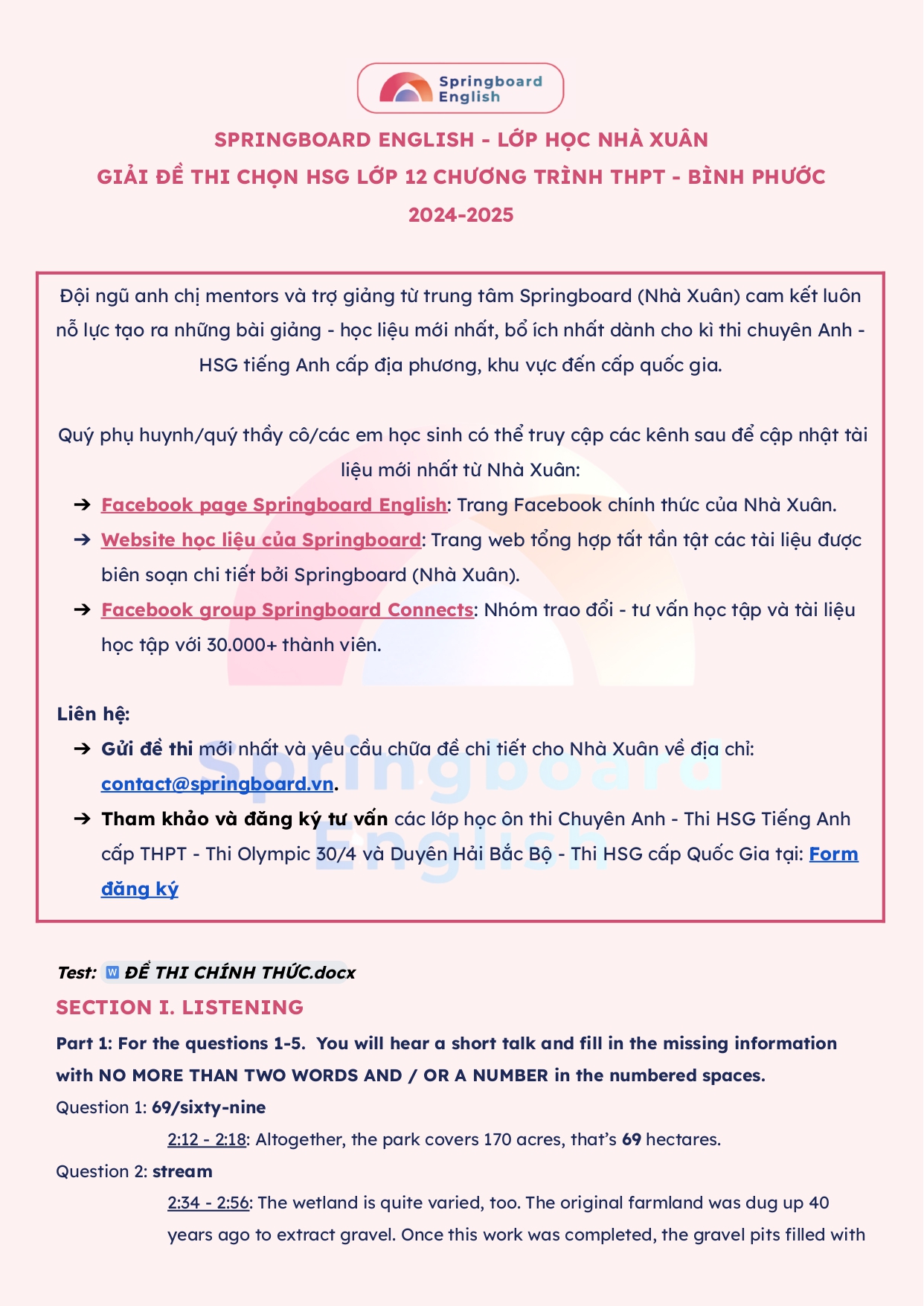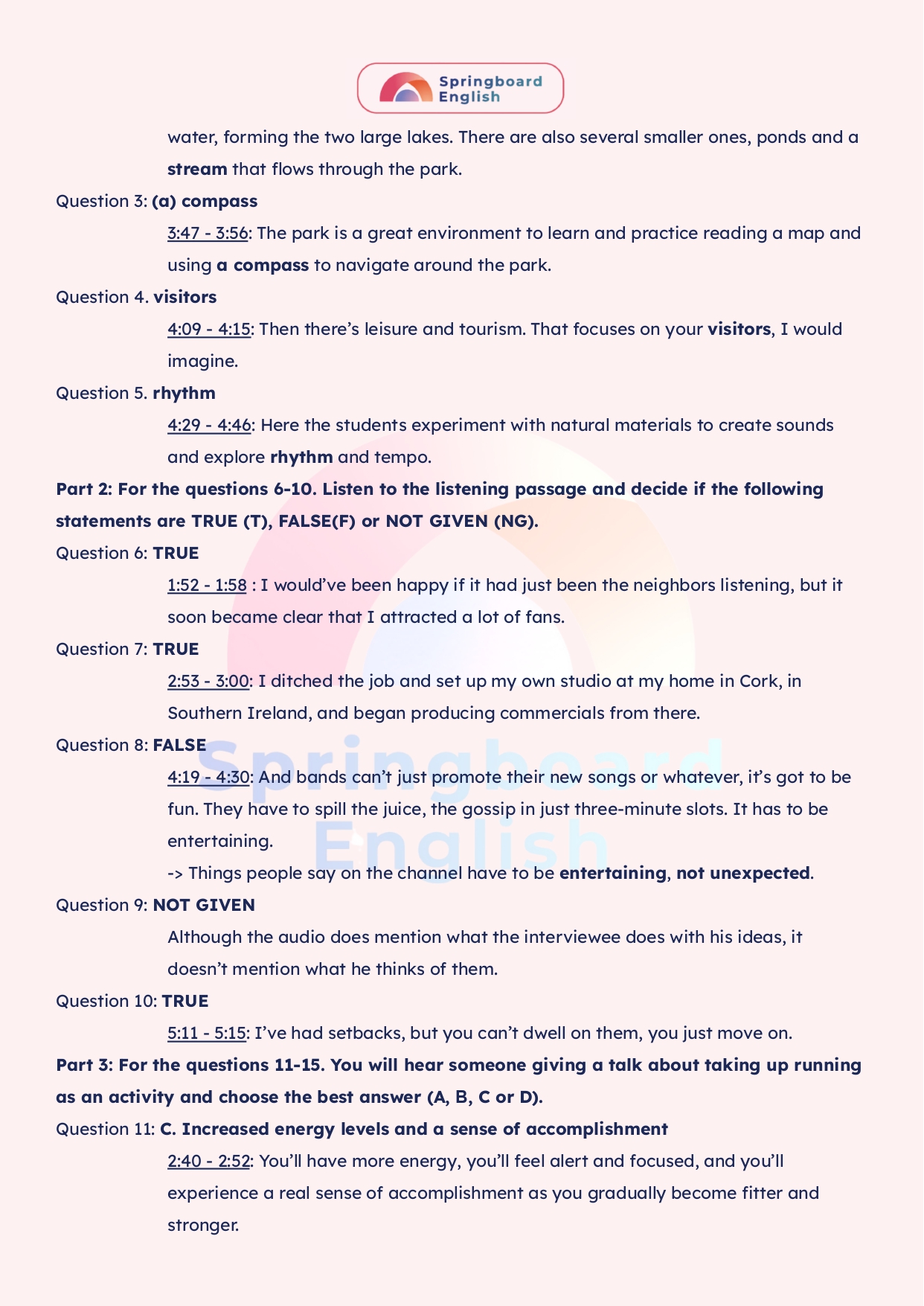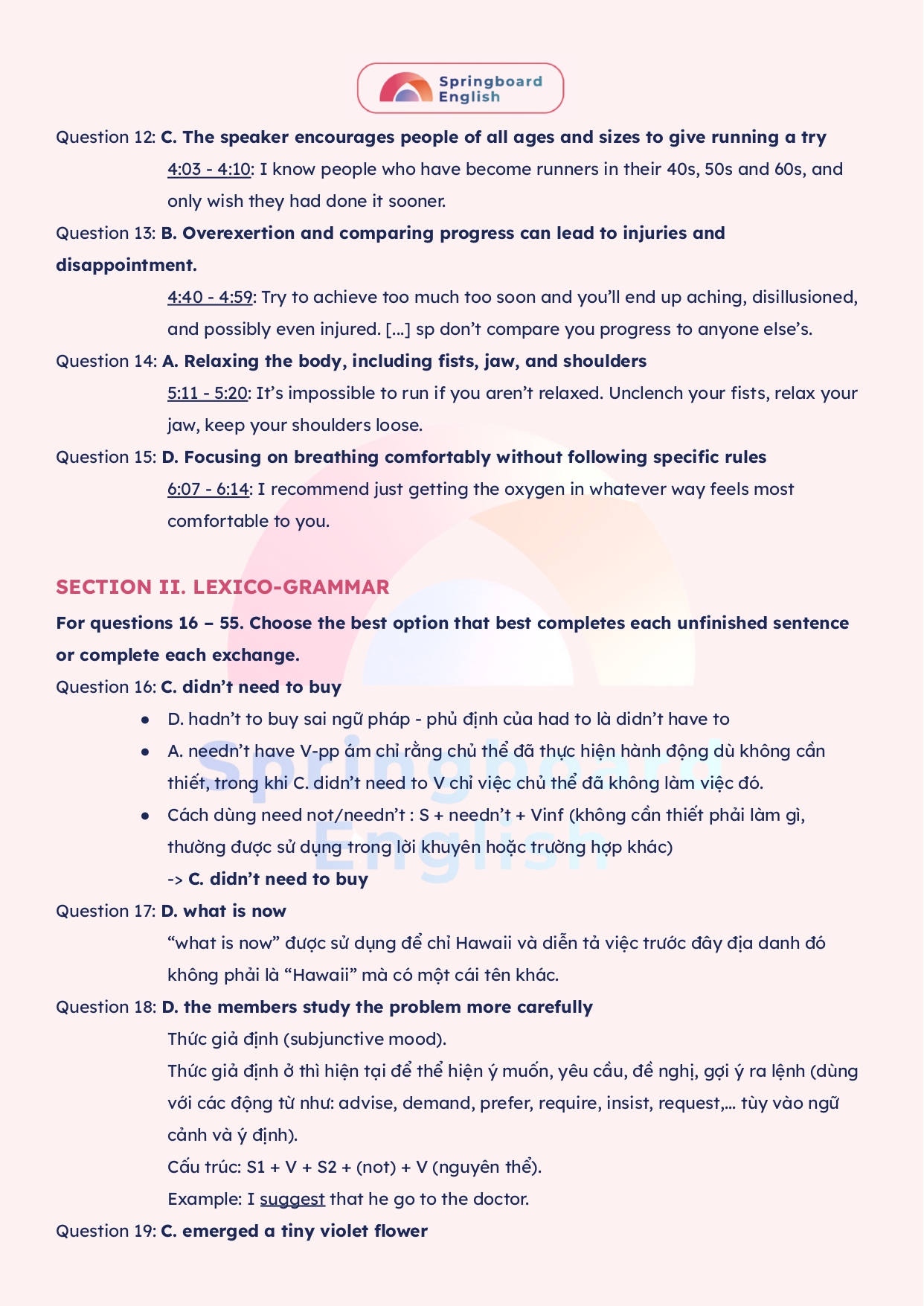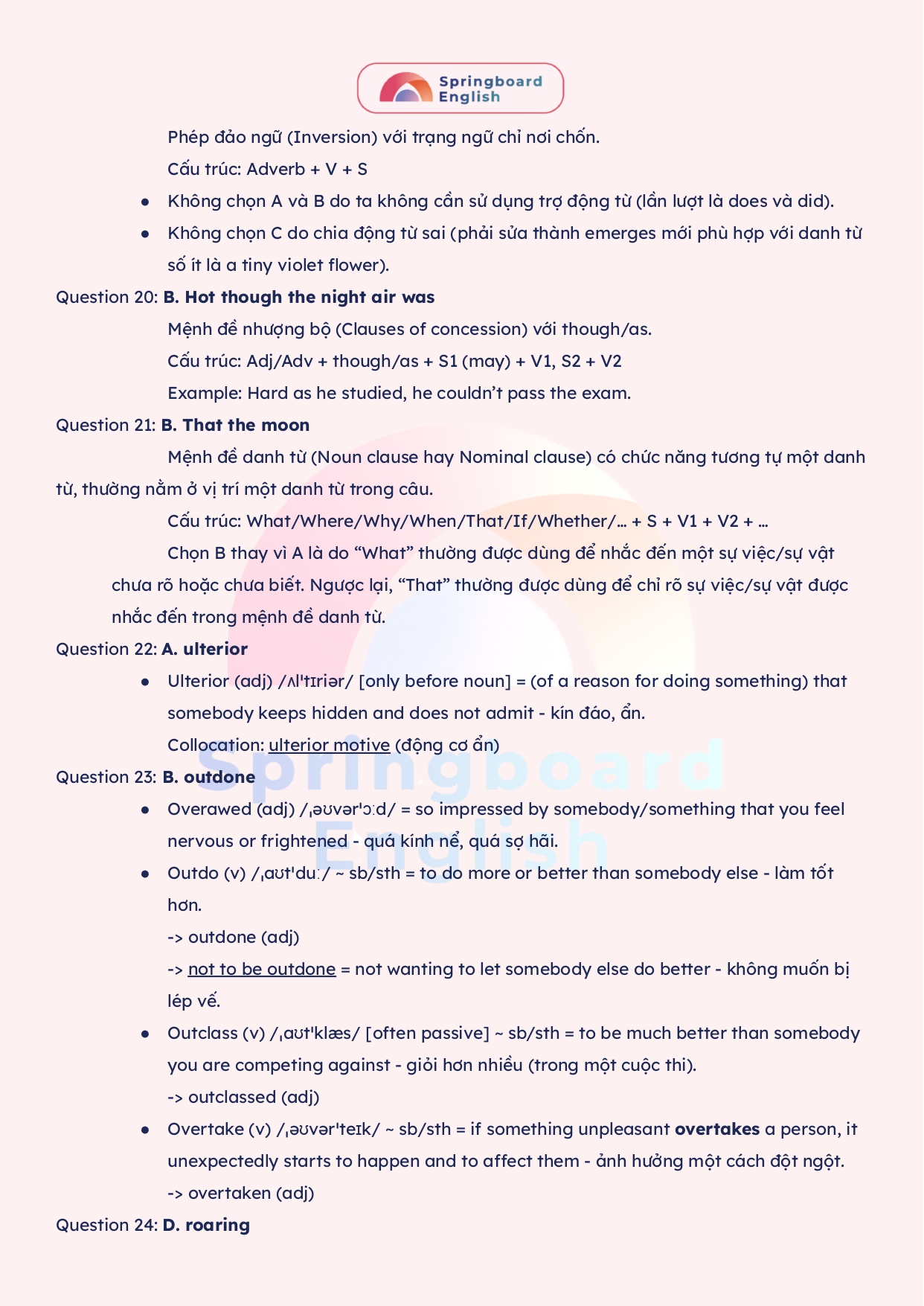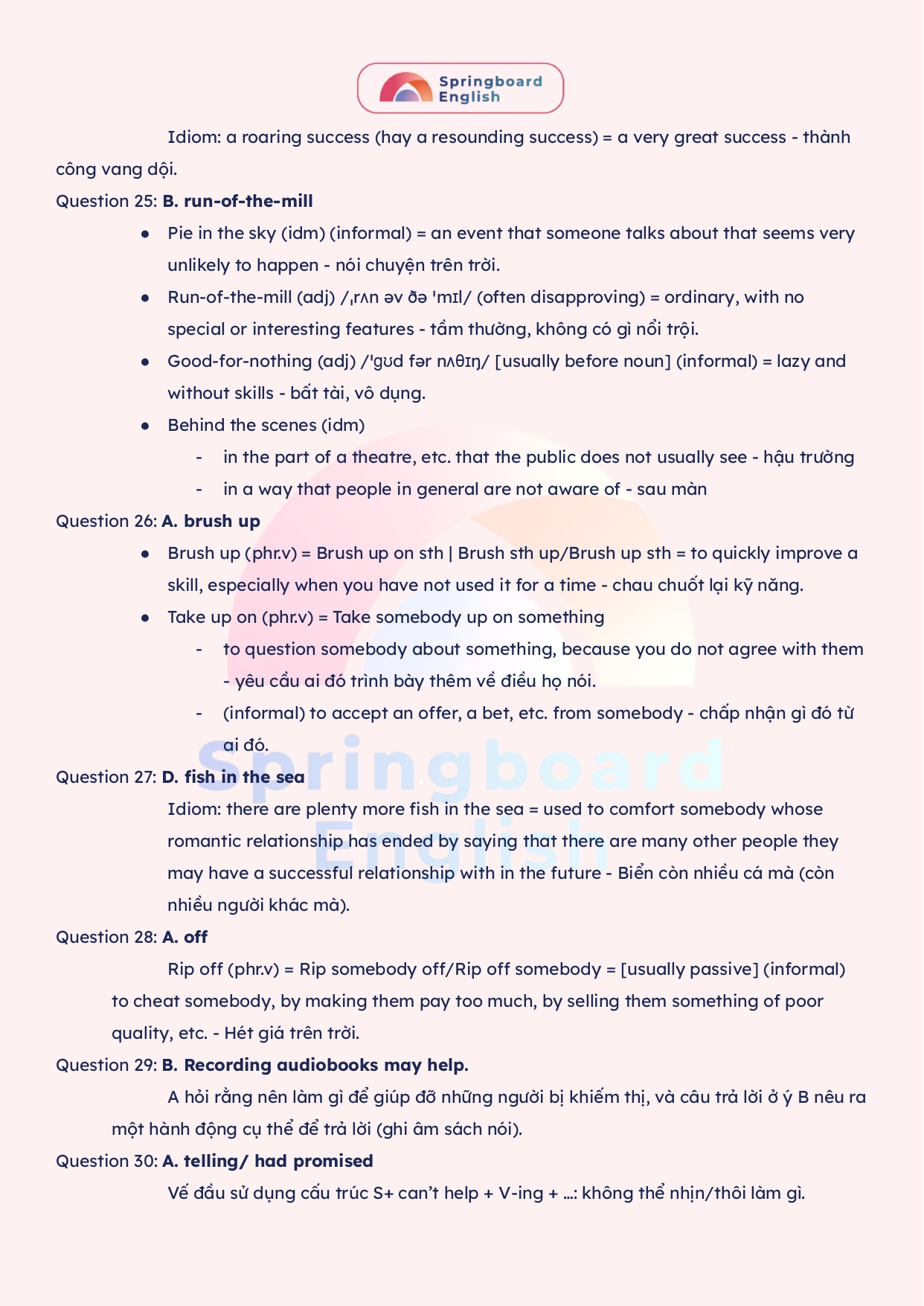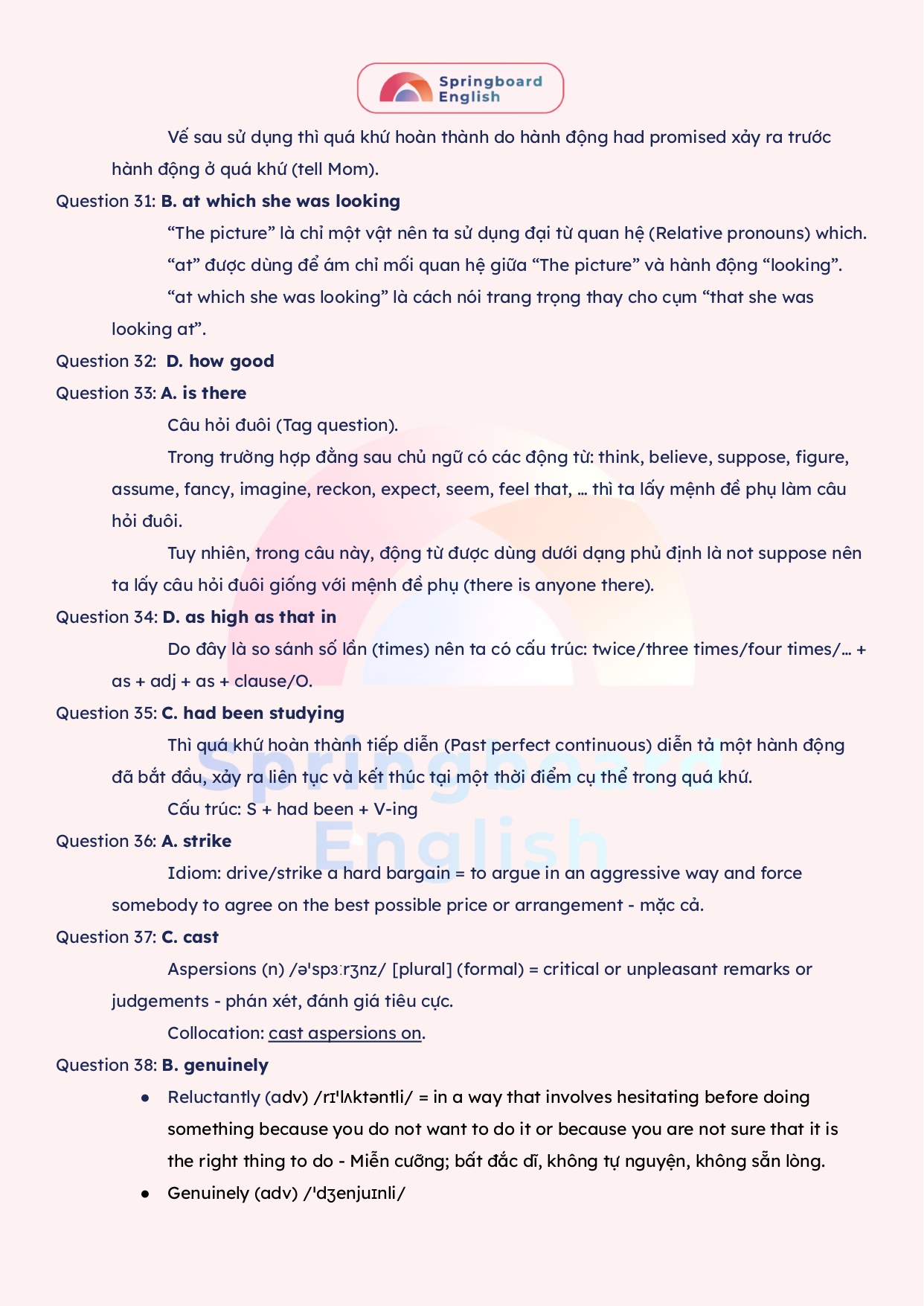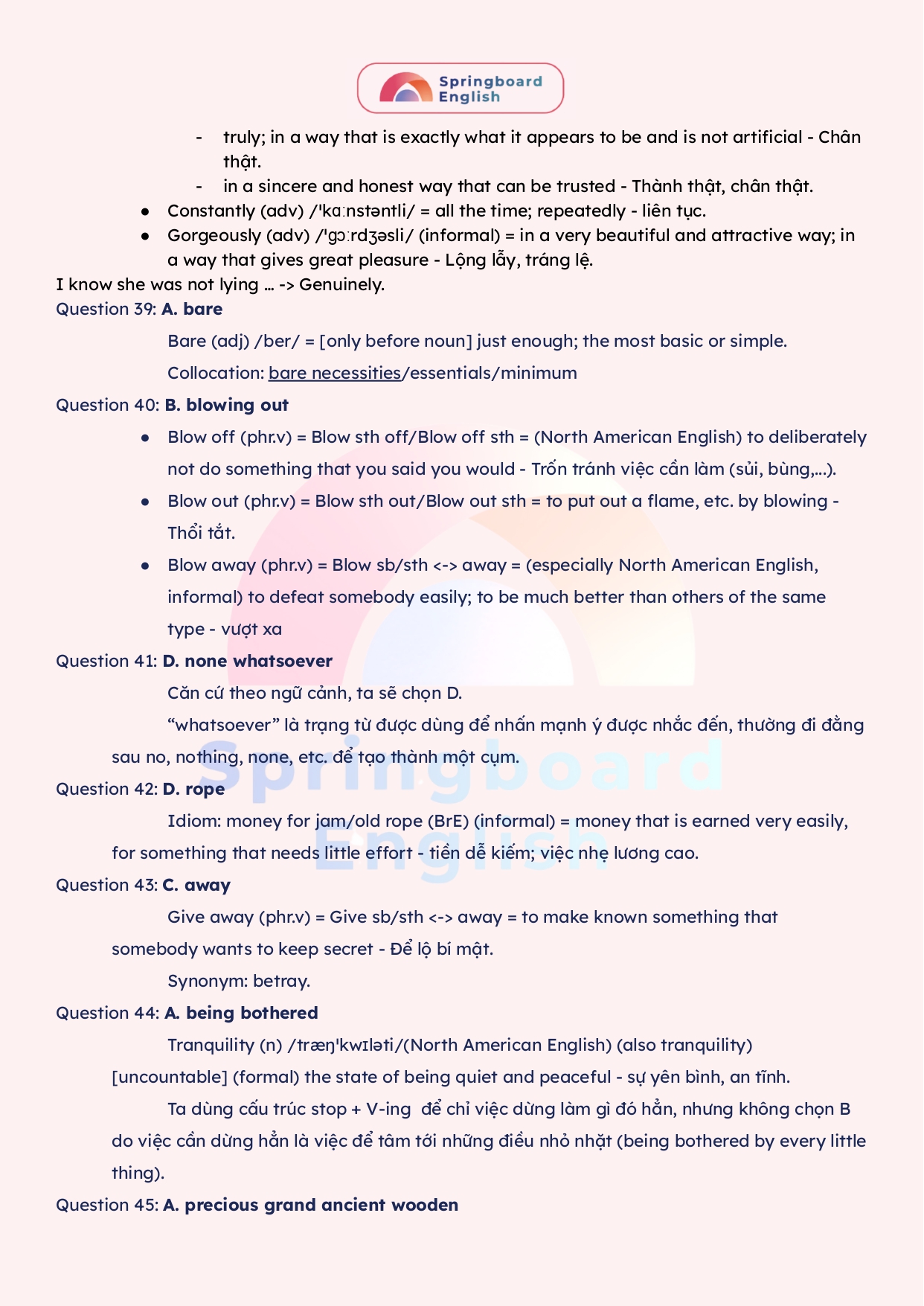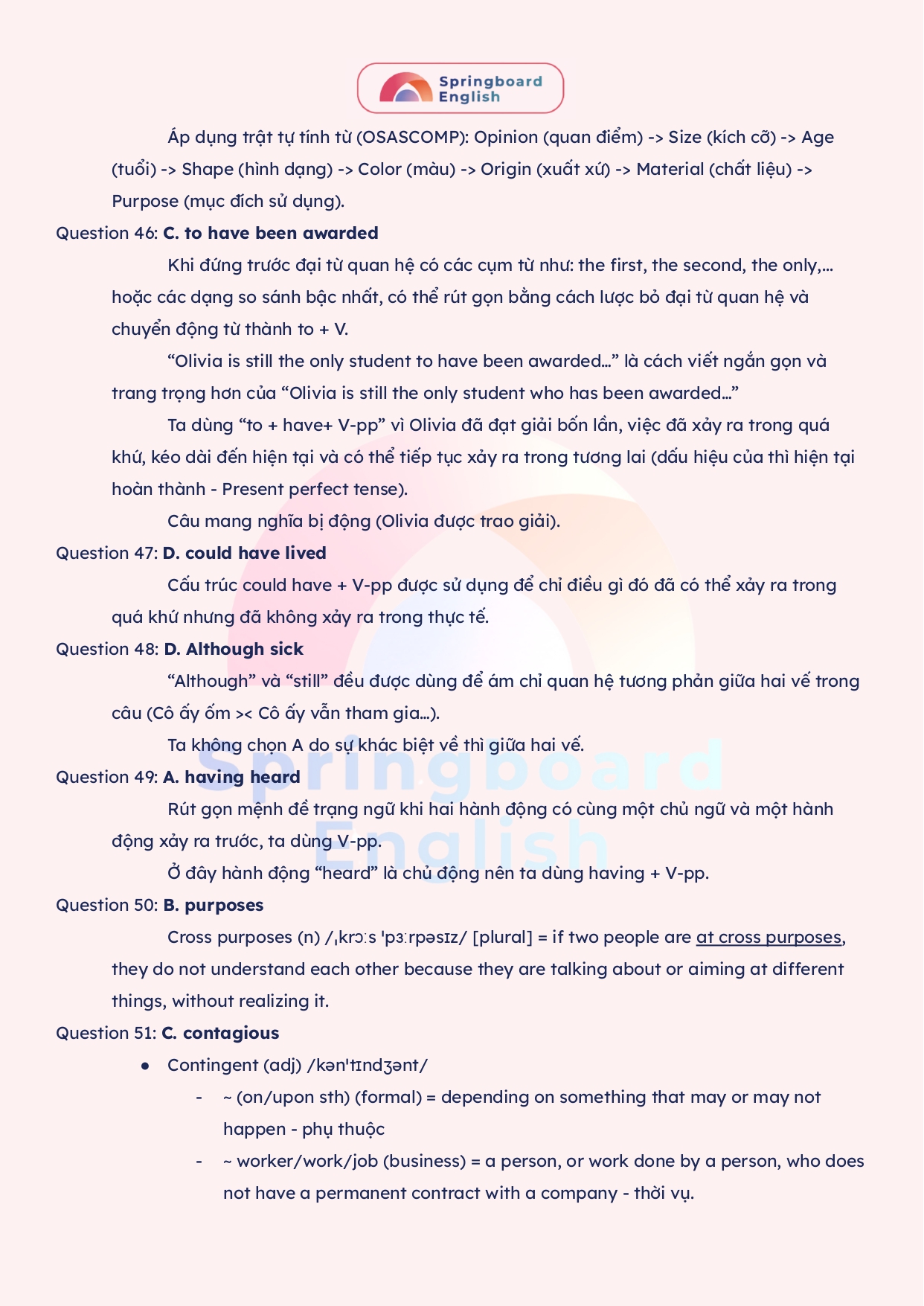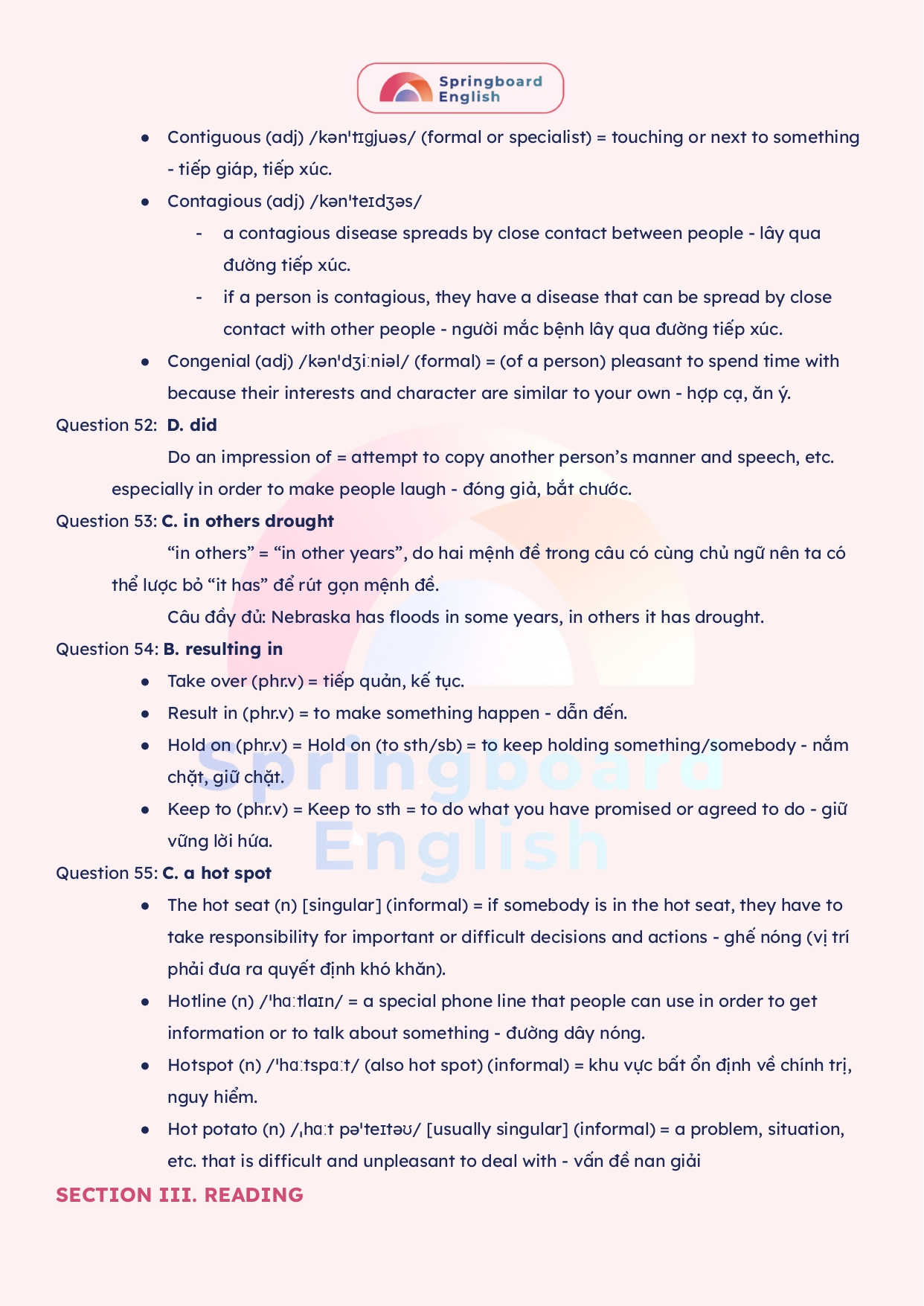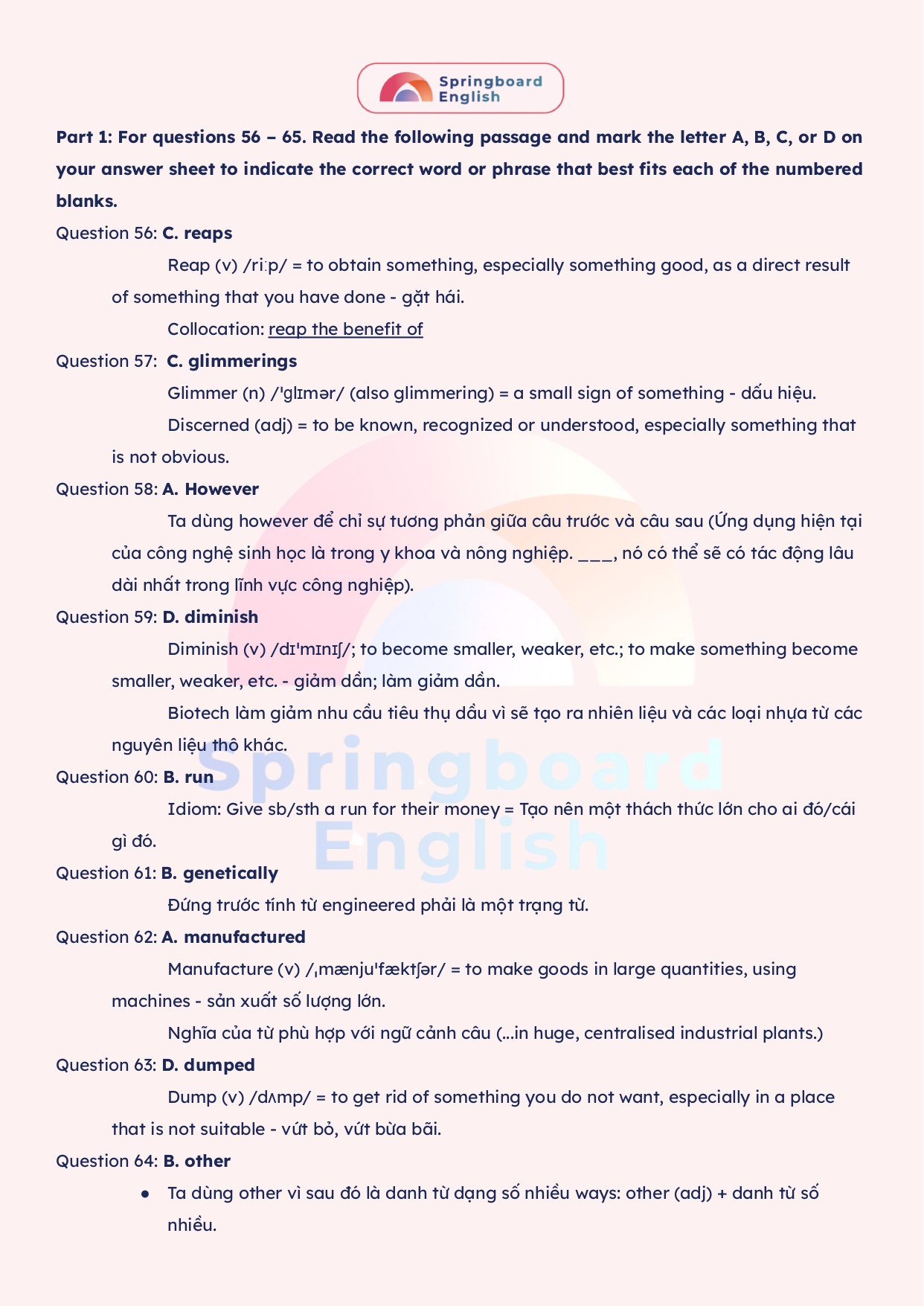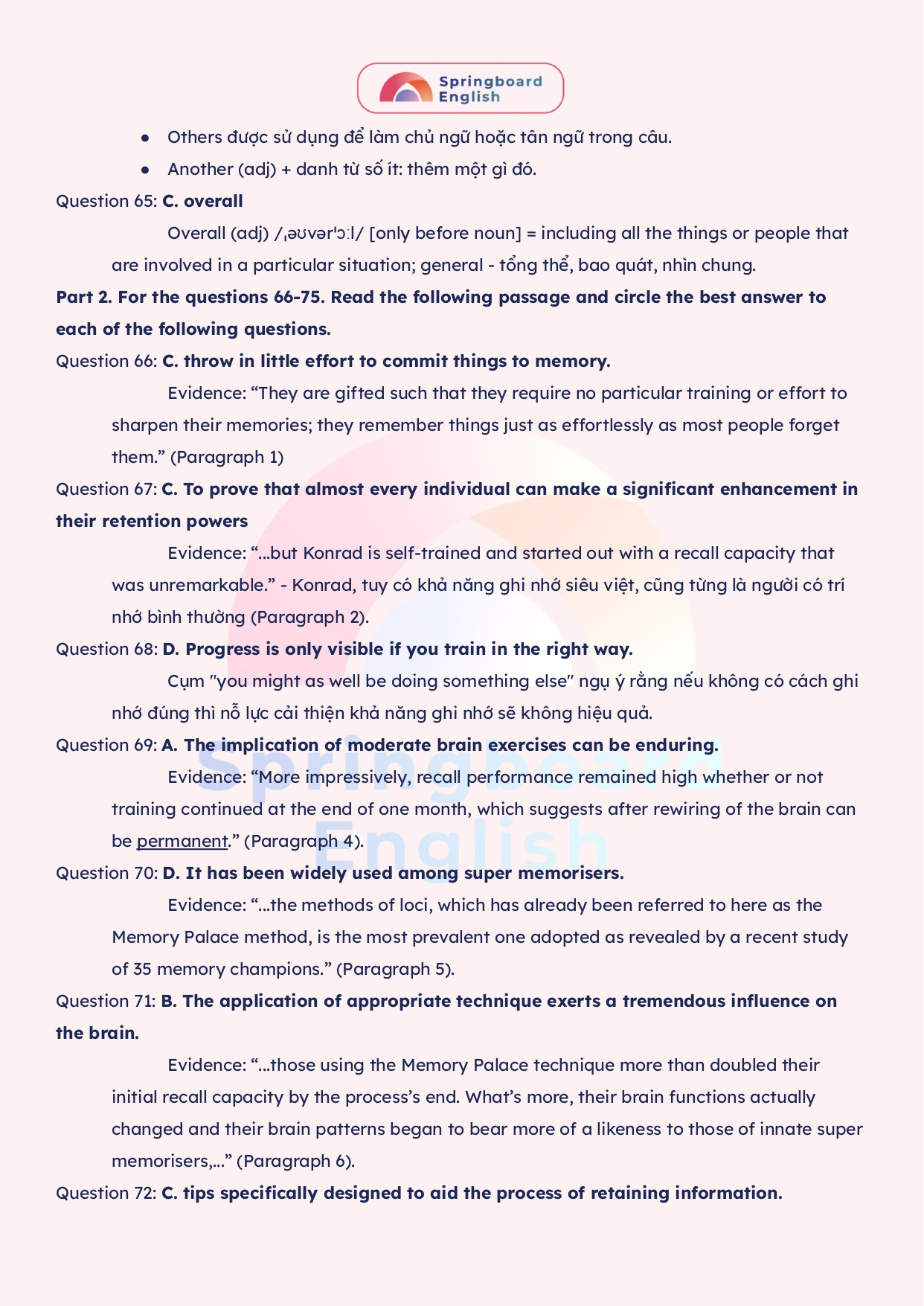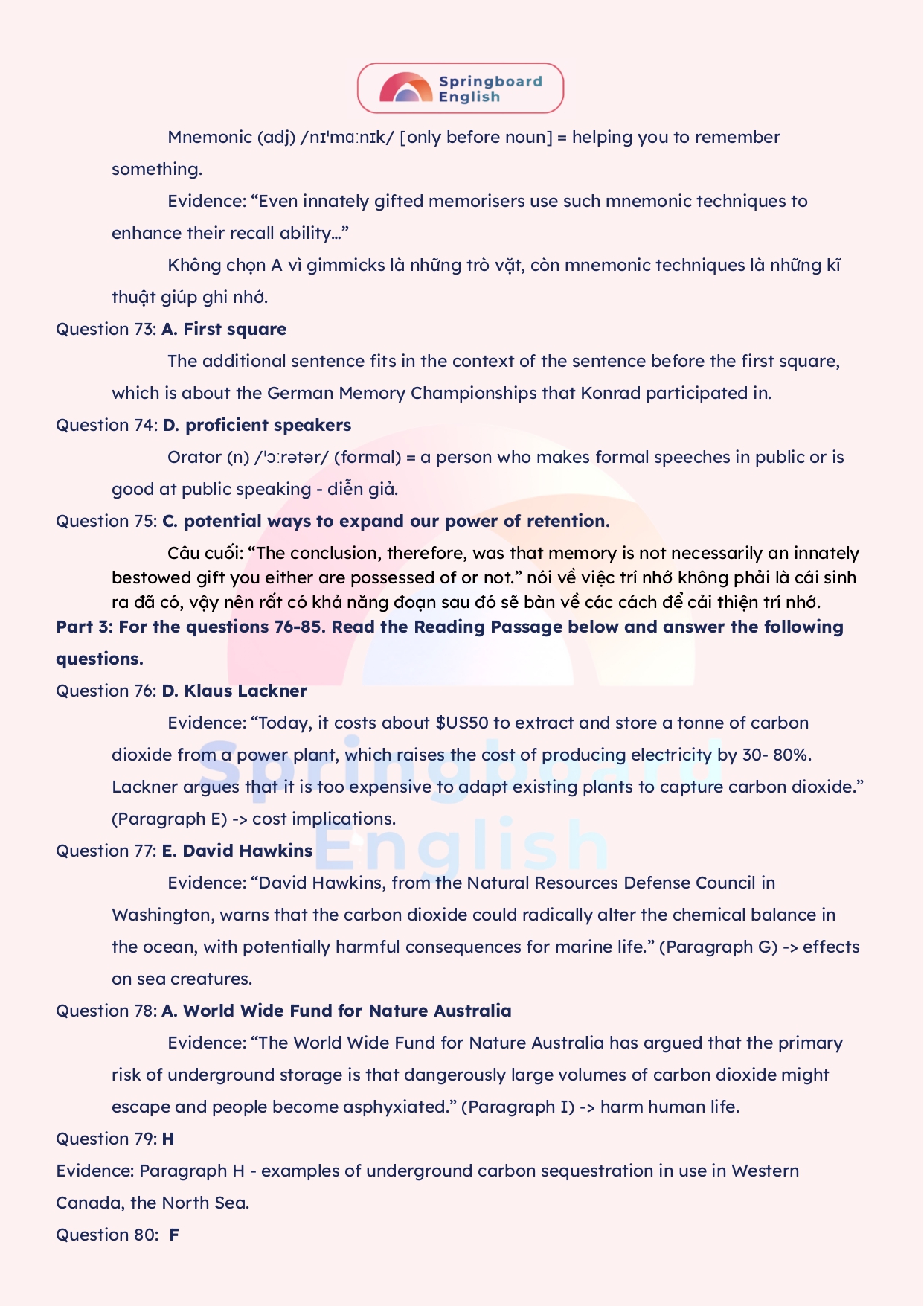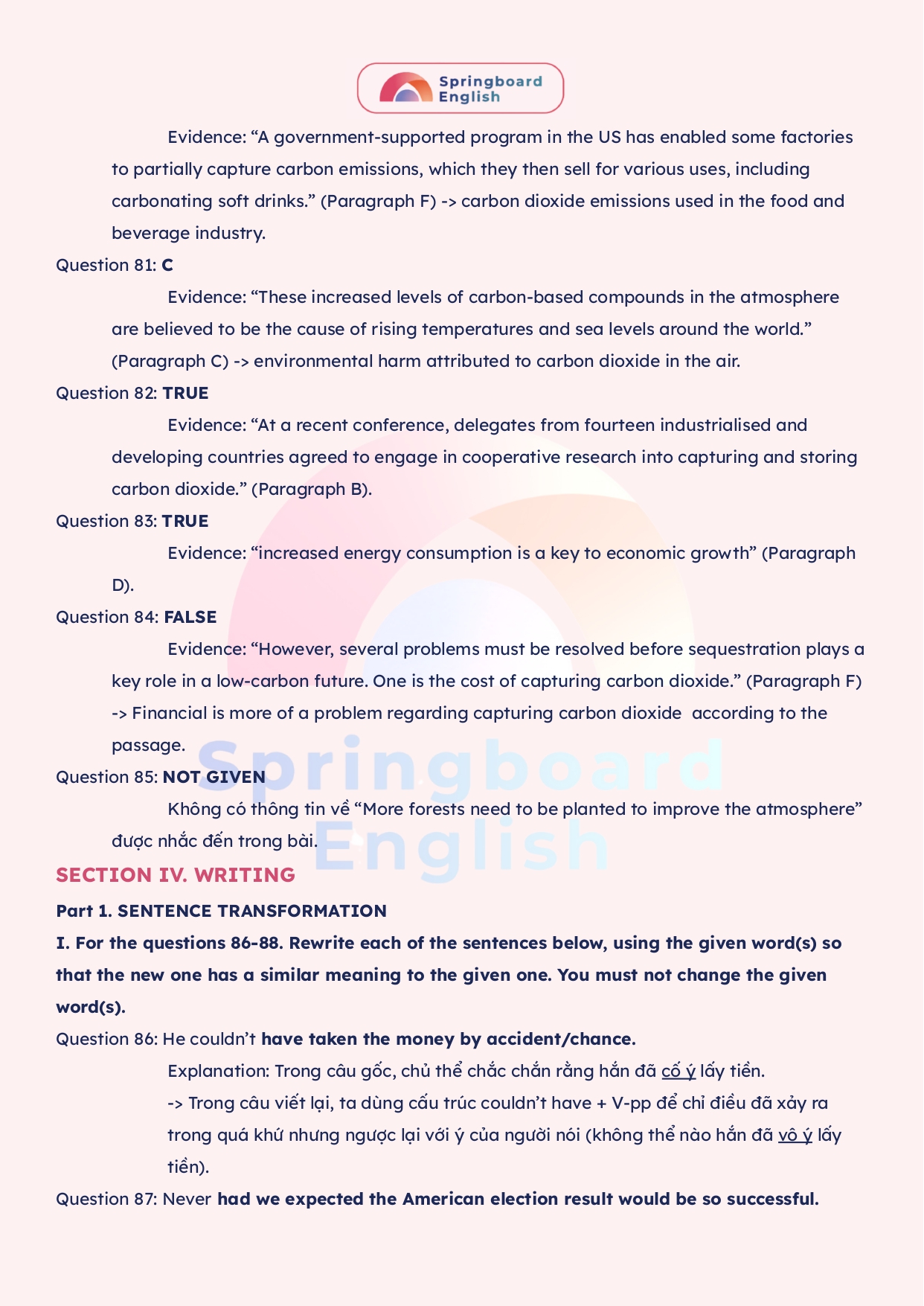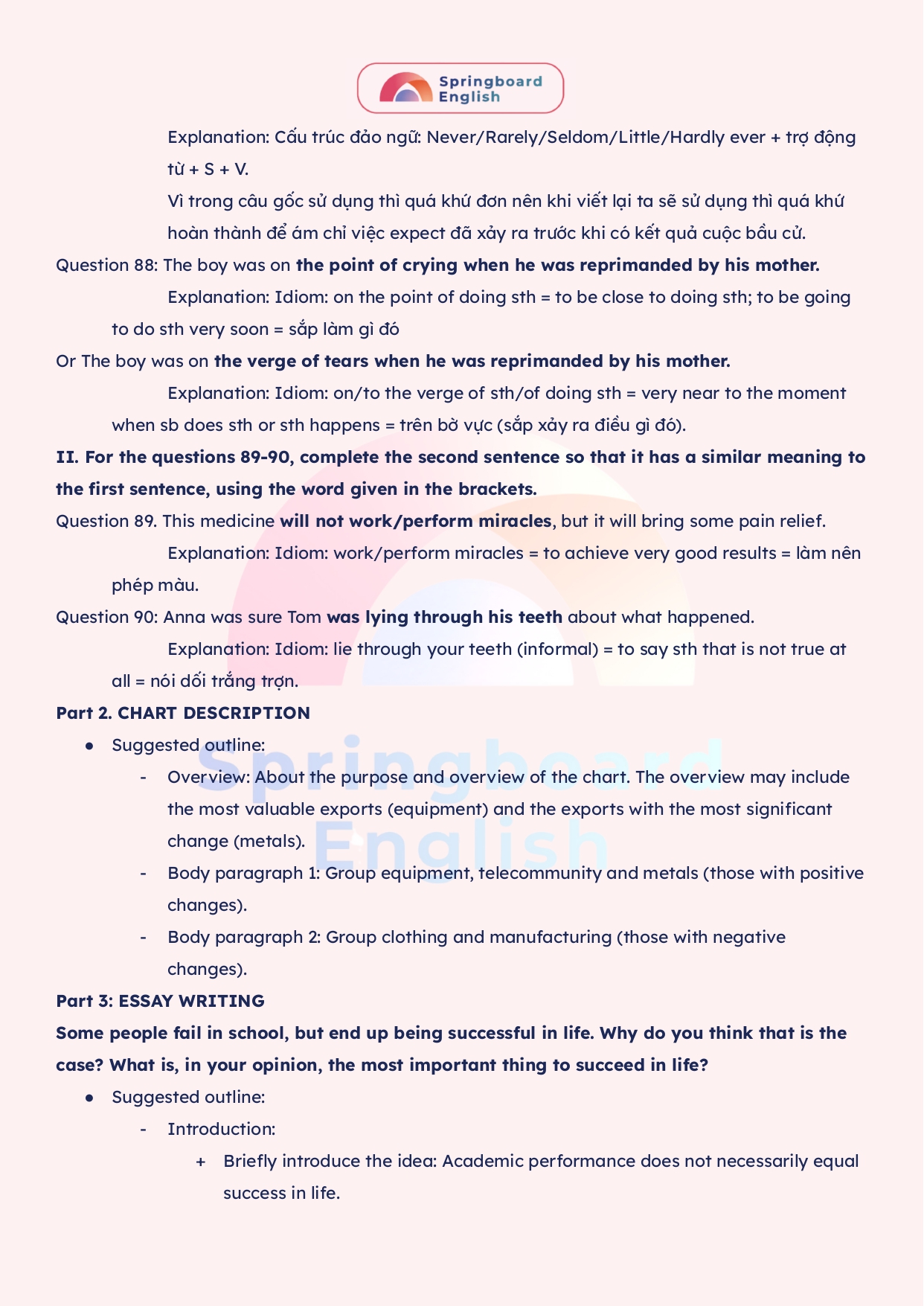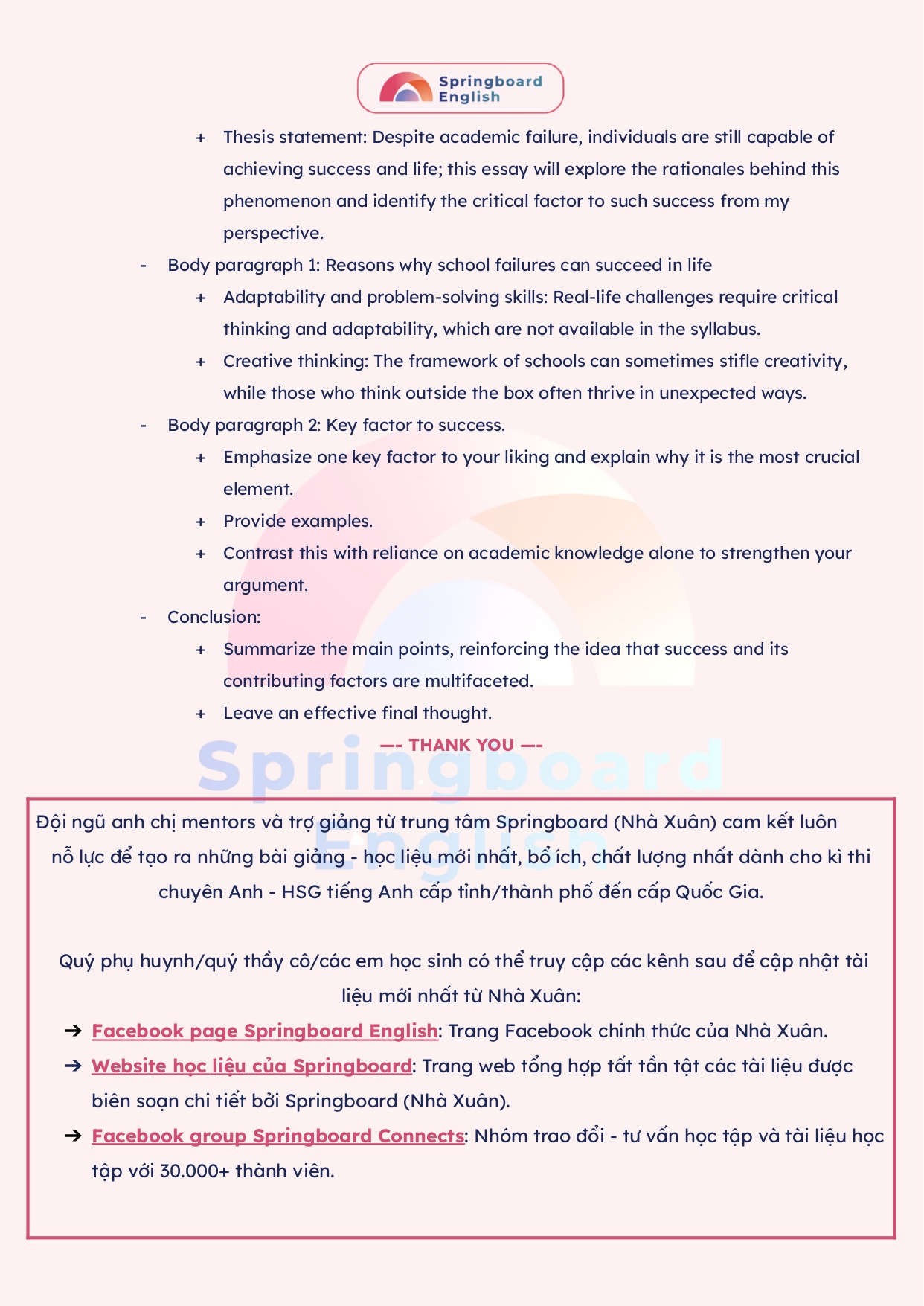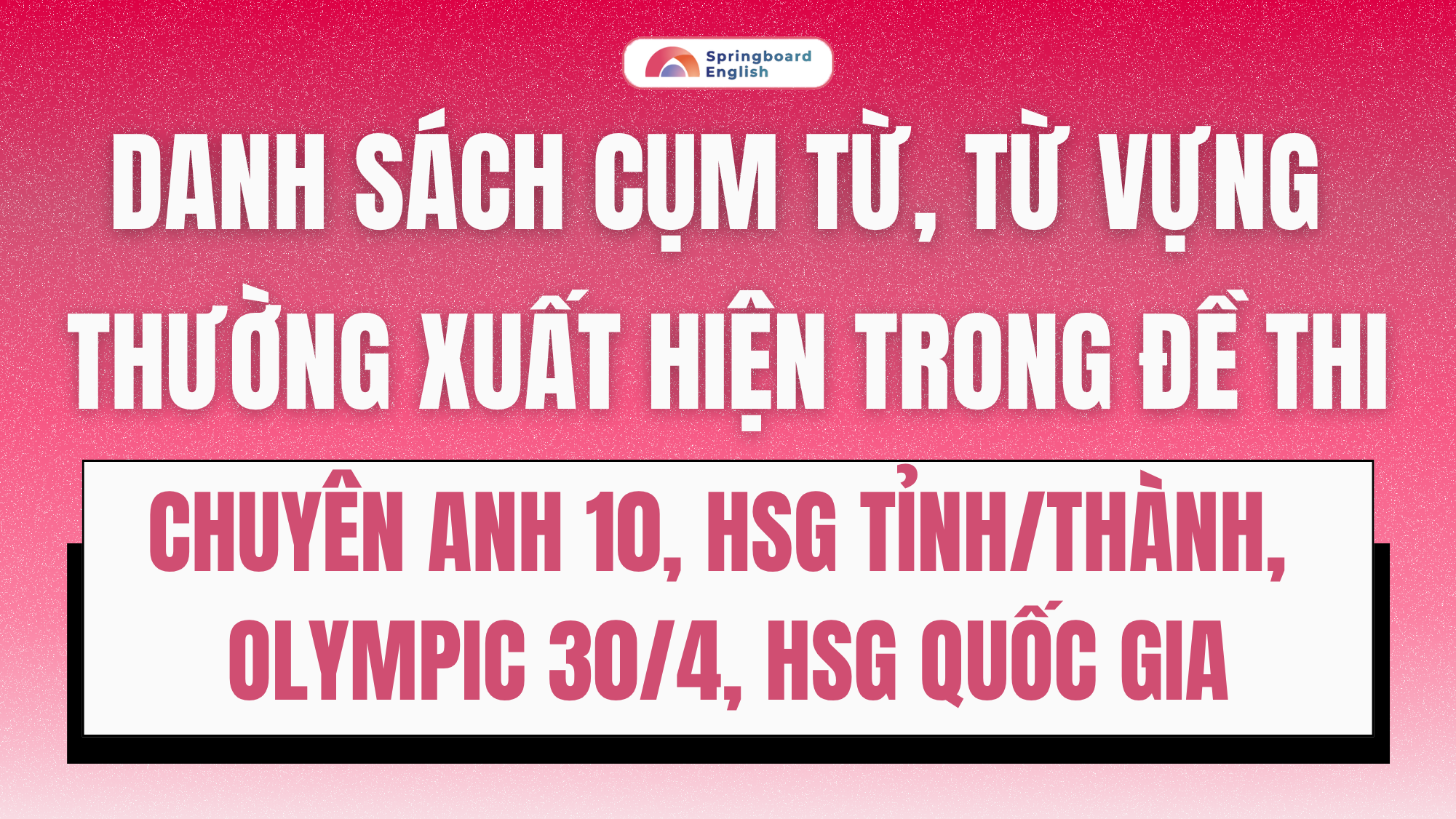Đề thi và Đáp án Chi tiết Kì thi Chọn HSG Tỉnh lớp 12 - Tỉnh Bình Phước năm học 2024-2025
Trong bài viết này, Đội ngũ trung tâm Springboard (Nhà Xuân) xin chia sẻ đến các quý phụ huynh, thầy cô, các em học sinh Đề thi và Đáp án có giải thích chi tiết ở kì thi chọn học sinh giỏi tỉnh Tiếng Anh lớp 12 – tỉnh Bình Phước năm học 2024-2025.
Phần đáp án chi tiết được giới thiệu ở bài viết này là tài liệu được biên soạn trực tiếp bởi đội ngũ chuyên môn Nhà Xuân, đồng thời là bản cập nhật mới nhất trong năm 2025.
Kéo xuống dưới cùng để xem hết đáp án có giải thích chi tiết.
Phần nghe - Đề thi chọn HSG lớp 12 tỉnh Bình Phước năm học 2024-2025
Đề thi HSG Tiếng Anh lớp 12 - tỉnh Bình Phước năm học 2024-2025
SỞ GIÁO VÀ ĐÀO TẠO BÌNH PHƯỚC | KỲ THI CHỌN HỌC SINH GIỎI CẤP TỈNH THPT NĂM HỌC: 2024-2025
|
Môn: TIẾNG ANH
(Đề thi gồm có 09 trang) Thời gian làm bài: 180 phút
Ngày thi: 06/11/2024
Họ và tên thí sinh…………………………………….. Số báo danh…………………………………….. Học sinh trường………………………………. Ngày sinh…………………………………………. | Cán bộ coi thi 1 Họ và tên……………………………….. Chữ ký…………………………………… Cán bộ coi thi 2 Họ và tên……………………………….. Chữ ký…………………………………… |
SECTION I. LISTENING (3.0 POINTS)
HƯỚNG DẪN PHẦN THI NGHE HIỂU
- Bài nghe gồm 3 phần, mỗi phần được nghe 2 lần, mỗi lần cách nhau 10 giây, mở đầu và kết thúc mỗi phần nghe đều có tín hiệu.
- Mở đầu và kết thúc bài nghe có tín hiệu nhạc.
- Mọi hướng dẫn cho thí sinh (bằng tiếng Anh) đã có trong bài nghe.
Part 1: For the questions 1-5. You will hear a short talk and fill in the missing information with NO MORE THAN TWO WORDS AND / OR A NUMBER in the numbered spaces. (1.0 point)
Hinchingbrooke Country Park
The park
Area: 1.___________hectares
Habitats: wetland, grassland and woodland
Wetland: lakes, ponds and a 2. ____________
Wildlife includes birds, insects and animals
Subjects studied in educational visits include
Science: Children look at data about plants, etc.
Geography: includes learning to use a map and 3. ____________
History: changes in land use
Leisure and tourism: mostly concentrates on the park’s 4. ____________
Music: Children make sounds with natural materials, and experiment with 5. ___________ and tempo.
Part 2: For the questions 6-10. Listen to the listening passage and decide if the following statements are TRUE (T), FALSE(F) or NOT GIVEN (NG). (1.0 point)
Question 6. The radio station he started was more popular than he had expected.
Question 7. James says that his career in music has included making advertisements.
Question 8. The people interviewed on the channel often say unexpected things.
Question 9. James says about his ideas that some of them are not very realistic.
Question 10. James’s advice to listeners who might want to go into business is to forget about past problems.
Part 3: For the questions 11-15. You will hear someone giving a talk about taking up running as an activity and choose the best answer (A, В, C or D). (1.0 point)
Question 11. According to the speaker, what benefits can be gained from taking up running?
A. Improved flexibility and coordination
B. Stronger upper body muscles and increased stamina
C. Increased energy levels and a sense of accomplishment
D. Reduced risk of chronic diseases
Question 12. What is the speaker’s response to concerns about age or weight when it comes to running?
- Running is not suitable for older individuals or those who are overweight.
B. Running can only be enjoyed by those who are young and physically fit.
C. The speaker encourages people of all ages and sizes to give running a try.
D. The speaker believes that running should be avoided if one feels embarrassed.
Question 13. What caution does the speaker give regarding running? - It is important to push oneself to achieve quick results.
B. Overexertion and comparing progress can lead to injuries and disappointment.
C. One should focus on intensity rather than gradual progression.
D. Running should be done only in good weather conditions.
Question 14. According to the speaker, what is an essential aspect of running technique?
A. Relaxing the body, including fists, jaw, and shoulders
B. Tensing the muscles for increased power
C. Maintaining a hunched posture for better balance - Concentrating on moving forward without considering posture
Question 15. What does the speaker recommend regarding breathing during running?
A. Following specific techniques for inhaling and exhaling
B. Breathing through the nose and counting footfalls for synchronization
C. Holding the breath momentarily for increased lung capacity
D Focusing on breathing comfortably without following specific rules
SECTION II. LEXICO-GRAMMAR (5.0 POINTS)
For questions 16 – 55. Choose the best option that best completes each unfinished sentence or complete each exchange.
Question 16: Luckily, I ________ a new pair of sunglasses as I found mine at the bottom of a bag.
- needn’t have bought B. needed not to buy
- didn’t need to buy D. hadn’t to buy
Question 17: The first people to live in _______ Hawaii were the Polynesians, who sailed there in large canoes from other Pacific Islands about 2,000 years ago.
- now where is B. the place is now C. now this is D. what is now
Question 18: The chairman requested that ________.
- the members studied the problem more carefully
- the problem was more carefully studied
- with more carefulness the problem could be studied
- the members study the problem more carefully
Question 19: In the middle of the blue river _________.
- does a tiny violet flower emerge B. did a tiny violet flower emerge
- emerged a tiny violet flower D. emerge a tiny violet flower
Question 20: _________, they slept soundly.
- Hot though was the night air B. Hot though the night air was
- Hot as was the night air D. Hot although the night air was
Question 21: _______ appears considerably larger at the horizon than it does overhead is merely an optical illusion.
- What the moon B. That the moon
- When the Moon D. The Moon which
Question 22: I am rather suspicious of your brother’s sudden concern for your welfare and fear that he may have _______ motives.
- ulterior B. secondary C. untold D. concealed
Question 23: Mary said she wanted to be Prime Minister when she grew up but Anna, not to be ________, said she was going to be Queen.
- overawed B. outdone C. outclassed D. overtaken
Question 24: The first amusement park in our city was a ________ success for its owners. Everybody would go there to have a good time.
- cracking B ringing C sparking D roaring
Question 25: The actors gave a very ________ performance, and the critics expressed their disapproval in their reports the following day.
- pie-in-the-sky B. run-of-the-mill
- good-for-nothing D. behind-the-scene
Question 26: You’ll have to _________ on your general knowledge before you go on that quiz show.
- brush up B. clear up C. take up D. smarten up
Question 27: I know you’re upset about breaking up with Tom, but there are plenty more _______.
- horses in the stable B. cows in the shed
- tigers in the jungle D. fish in the sea.
Question 28: They really ripped us________ at that hotel. They charged me a lot of money.
- off B. up C. out D. into
Question 29: – A: “What should be done to help people with visual impairments?”
– B: “__________”
- Not at all. B. Recording audiobooks may help.
- I can’t agree with you more. D. Let’s help those people
Question 30. We could not help________ Mom about the trip on Easter Day Dad_______ to me.
A. telling/ had promised B. to tell/ promised
- to tell/ promising D. telling/ had been promising
Question 31. The picture_________ was beautiful.
- she was looking B. at which she was looking
- at it she was looking D. at that she was looking
Question 32. In developing agricultural countries, crops depend heavily on__________ the weather is.
- how often B. how well C. Ø D. how good
Question 33. I don’t suppose there is anyone there, ________?
- is there B. isn’t there C. do I D. don’t I
Question 34. “The inflation rate in Greece is five times _________ my country,” he said.
- as much as that in B. more than that in
- as many as that in D. as high as that in
Question 35. By the end of last March, I_________ English for five years.
- have been studying B. will have been studying
- had been studying D. will have studied
Question 36.We’ve had to quit our cooperation with this wholesaler as we could never ________ a bargain. He asked for more than we could offer.
A. strike B. hit C. beat D. knock
Question 37. My golden rule is not to ________ aspersions on how other people bring up their children.
A. make B. give C. cast D. waste
Question 38. I know she was not lying when she apologized because she seemed ________ sorry
for what she had done.
- reluctantly B. genuinely C. constantly D. gorgeously
Question 39. Who need more than the _________ necessities of life?
A. bare B. naked C. pure D. sole
Question 40. Lisa is so excited about her 6th birthday that she keeps practicing _________ birthday candles!
- blowing off B. blowing out C. blowing on D. blowing away
Question 41. _ David: “Are there any cookies left?”
– John: “No, _________ .”
- not anything B. nothing at all
- nothing whatever D. none whatsoever
Question 42.Writing rhymes for birthday cards is really easy. It’s money for old ________ .
A. boot B. rubbish C. bread D. rope
Question 43. Unfortunately, our secret plans had been given _________ by someone before we managed to put them into practice.
- up B. out C. away D. in
Question 44. If we want to develop inner tranquility, we have to stop________ by every little thing.
- being bothered B. bothering C. to bother D. to be bothered
Question 45. When my parents traveled to Singapore, they bought me a/an piano on my birthday.
- precious grand ancient wooden B. wooden grand ancient precious
- precious ancient grand wooden D. ancient grand precious wooden
Question 46. Olivia is still the only student__________ the first prize four times for the best design.
A.to be awarding B. being awarded
C.to have been awarded D. to have awarded
Question 47. How I wish your mother __________ long enough to see all your accomplishments.
- was living B. must have lived
- might be living D. could have lived
Question 48. ______, the “Patient 31” still participated in a gathering at a church in Daegu, Korea.
- Although she is sick B. Because she is sick
- Because sick D. Although sick
Question 49. We decided not to travel, __________ the terrible weather forecast.
- having heard B. we heard C. having been heard D. being heard
Question 50. He didn’t realize they had been talking at cross ________ until he was asked an irrelevant question.
- aims B. purposes C. intentions D. beliefs
Question 51. The plague known as the Black Death was a_________ disease in the 18th century. However, this epidemic is now controlled thanks to advancements in medical science.
- contingent B. contiguous C. contagious D. congenial
Question 52. My friend is good at mimicking people. He _________ a great impression of Charlie Chaplin.
- took B. gave C. made D. did
Question 53. Nebraska has floods in some years, __________.
- others in drought B. droughts are others
C.in others drought D. while other droughts
Question 54. Many of these were accepted during compromise negotiations, ________tighter regulations than originally proposed.
- taking over B. resulting in C. holding on D. keeping to
Question 55. An area of political unrest or danger is called __________.
- a hot seat B. a hot line C. a hot spot D. a hot potato
SECTION III: READING (6.0 POINTS)
Part 1: For questions 56 – 65. Read the following passage and mark the letter A, B, C, or D on your answer sheet to indicate the correct word or phrase that best fits each of the numbered blanks.
(2 points)
Modern industry pollutes, and it also seems to cause significant changes to the climate. What is needed is an industry that (56) ___________ the benefits without the costs. And the (57) ____________ of such an industry can now be discerned .That industry is based on biotechnology. At the moment, biotech’s main uses are in medicine and agriculture. (58)_________ , its biggest long-term impact may be industrial. Biotechnology will (59) ____________ demand for oil by taking the cheapest raw materials imaginable, carbon dioxide and water, and using them to make fuel and plastics.
It is now possible to create enzymes that work thousands of times faster than their natural counterparts. These should turn the manufacture of ethanol as a petrol additive from a subsidised boondoggle into a industry that can pay its way. Biotechnologists are also working on enzymes that can digest cellulose. Turning cellulose into fermentable sugars really would give petrol a (60) ____________ for its money.The plastics industry, too, may be transformed by biotechonology. There are now plastics made entirely by bacteria that have had their metabolic pathways redesigned. Soon, plastics may be grown on farms, in ( 61) ________ engineered plants, rather than being (62) ________ in huge, centralised industrial plants. Plastics and fuels made in this way would have several advantages. They can be called “renewables” since nothing is depleted to make them. They would be part of the natural carbon cycle, borrowing that element from the atmosphere for a few months, and returning it when they were burned or (63) ____________. That means that they could not possibly contribute to global warming. They would also be environmentally friendly in (64) ____________ ways. Bioplastics are biodegradable, and biofuels are a lot cleaner than petrol and diesel, and would be cleaner (65) _________ even than the fuel-cell technology. All in all, the future could be green in ways that traditional environmentalists had not expected.
Question 56. A. delivered B. collects C. reaps D. produces
Question 57. A. impacts B. ages C. glimmerings D. outgrowth
Question 58. A. However B. Therefore C. In addition D. But
Question 59. A. satisfy B. preserve C. boost D. diminish
Question 60. A. path B. run C. race D. climb
Question 61. A. genetical B. genetically C. genetic D. geneticist
Question 62. A. manufactured B. substituted C. done D. generated
Question 63. A. garbaged B. wasted C. disposed D. dumped
Question 64. A. others B. other C. another D. the others
Question 65. A. almost B. wholly C. overall D. thoroughly
Part 2. For the questions 66-75. Read the following passage and circle the best answer to each of the following questions. (2 points)
There are people in this world who are innately possessed of an ability to remember things with quite an extraordinary degree of detail and exactness. These super memorisers, as they are known, typically possess a brain naturally and distinctively wired to maximize its memorizing potential. They are gifted such that they require no particular training or effort to sharpen their memories; they remember things just as effortlessly as most people forget them. Few of us are born with such gifts, sadly, but there is much cause for optimism yet for those looking to improve their brain’s performance tangibly in this area; a fact which Boris Konrad is testament to.
Konrad is a champion memoriser who, in winning gold in the German Memory Championships one year recognized and recalled the names of 195 people in just fifteen minutes. [■] His powers of recollection, then, are as admirable as they are undisputed, but Konrad is self-trained and started out with a recall capacity that was unremarkable.
[■] Instead, he spent years developing memory strategies and employing those strategies to improve in the area through practice and dedication. [■] He, then, is a living proof that the average Joe with a gift for forgetfulness can reinvent himself in the area. [■] However, his example is as much a reminder of the extent of devotion that is required to reach this level as it is of the possibilities if one is prepared to put in the effort, and there are not many people prepared to expend a similar level of effort to this end, which is what really makes Konrad unique.
That said, whilst you may not become a super memoriser overnight, new research suggests that it is possible to tangibly improve your memory in a relatively short space of time by devoting roughly half an hour of your every day to the process. It is necessary to learn and employ memorizing strategies such as the Memory Palace technique Konrad uses, though, to yield such results; otherwise, you might be as well be doing something else. In one recent study, for example, participants spent one month training their memories in the aforementioned technique for 30 minutes every day, which more than doubled their ability to remember list of information after just 40 days. More impressively, recall performance remained high whether or not training continued at the end of one month, which suggests after rewiring of the brain can be permanent.
Even innately gifted memorisers use such mnemonic techniques to enhance their recall ability, and, of the recall methods which exist, the methods of loci, which has already been referred to here as the Memory Palace method, is the most prevalent one adopted as revealed by a recent study of 35 memory champions. Indeed, at a more rudimentary level, this method has been employed by orators and others required to remember long strings of interconnected information for some time, and it actually dates back to Ancient Greece, where it was first conceived of, remaining prevalent right through to the Middle Ages and the Renaissance. It is only a new method then, today, in the sense that the skill had been lost as such to most people for a very long time. Indeed, many of today’s super memorisers employed it intuitively rather than in a conscious effort to enhance their recall powers.
Participants in the study was separated into three distinct groups, with one group receiving no memory training whatsoever and making no notable recall gains during the process. The second group dedicated time and effort to upping their recall capacity, but employed an everyday technique. However, those using the Memory Palace technique more than doubled their initial recall capacity by the process’s end. What’s more, their brain functions actually changed and their brain patterns began to bear more of a likeness to those of innate super memorisers, leading researchers to speculate that a total rewire might well be possible over time, such that a normal individual’s recall capacity could match that of any memory champion. The conclusion, therefore, was that memory is not necessarily an innately bestowed gift you either are possessed of or not. Most of us have the potential to hone and expand our memories very meaningfully indeed.
Question 66. According to the first paragraph, people with marvelous power of retention usually _______ .
- undergo rigorous practice to become that way.
- demonstrate brain functions resembling anyone else.
- throw in little effort to commit things to memory.
- be tangibly more intelligent than other people.
Question 67. Why are Konrad’s achievements mentioned in paragraph two?
- To underline the excellence of inborn super memorisers
- To demonstrate the disparity between laymen and super memorisers
- To prove that almost every individual can make a significant enhancement in their retention powers
- To show how even innate super memorisers have to exert themselves
Question 68. What does the writer mean in the phrase ‘you might as well be doing something else’ in paragraph three?
- It is futile to invest time in improving recall capacity.
- People should concentrate on their strengths.
- The Memory Palace technique is not universally suitable.
- Progress is only visible if you train in the right way.
Question 69. What did the study mentioned in the third paragraph conclude?
- The implication of moderate brain exercises can be enduring.
- The maintenance of a decent recall capacity requires continuous training.
- Your recall ability can more than double within one month.
- Progress is only noticeable with at least 30 minutes spent on brain training.
Question 70. What do we learn about the method of loci?
- It is superior to the Memory Palace method.
- Most skillful memorisers purposefully adopt it.
- It has evolved from methods first employed in Ancient Greece.
- It has been widely used among super memorisers.
Question 71. What did the results of the study mentioned in the final paragraph reveal?
- How the brains of super memorisers function is inimitable.
- The application of appropriate technique exerts a tremendous influence on the brain.
- Memory training is futile unless employing a confirmed technique.
- Most super memorisers are not talented at memorizing at birth.
Question 72. The word “mnemonic techniques” in paragraph 4 mostly means _______
- gimmicks used to improve brain functions.
- endowed talents of super memorisers.
- tips specifically designed to aid the process of retaining information.
- skills adopted by super memorisers to avoid absent-mindedness.
Question 73. Look at the four squares [■] that indicate where the following sentence could be added
to the passage.
Indeed, after just 30 seconds, examination, he is able to retain the order of an entire deck of cards.
Where would the sentence best fit?
- First square B. Second square C. Third square D. Fourth square
Question 74. The word “orators” in paragraph 4 mostly means _______
- language experts. B. body language experts.
- oral students. D. proficient speakers.
Question 75. The paragraph following the passage would most probably discuss _______
- further research into the workings of brains of super memorisers.
- the defeat of a normal person over a super memoriser in terms of recalling capacity.
- potential ways to expand our power of retention.
- the popularity of memory palace technique.
Part 3: For the questions 76-85. Read the Reading Passage below and answer the following questions. (2.0 points)
Answers Underground
Burying greenhouse gases to slow global warming
One way to stow global warming is to take the greenhouse gases that cause it and bury them. That is the idea behind projects now under way to capture emissions from power plants and factories and force them underground or deep into the ocean. There, proponents argue, they could be trapped for thousands of years.
This concept, known as carbon sequestration, is already being used by oil companies to improve the efficiency of oil wells, and now engineers have begun exploring ways to capture carbon dioxide emissions from power plants to reduce their impact on the environment. At a recent conference, delegates from fourteen industrialised and developing countries agreed to engage in cooperative research into capturing and storing carbon dioxide.
C.
The goal is to stabilise emissions of greenhouse gases that trap heat in the atmosphere. Over the past century, airborne carbon dioxide concentrations have risen by nearly a third, according to Scott Klara, sequestration manager at the US National Energy Technology Laboratory. Unless emissions are slashed by two thirds worldwide, the Intergovernmental Panel on Climate Change predicts that concentrations will rise to double the levels of the early 1700s, before the Industrial Revolution. These increased levels of carbon-based compounds in the atmosphere are believed to be the cause of rising temperatures and sea levels around the world. Ignoring the problem is therefore not an option.
Limiting emissions, however, is not an easy undertaking since increased energy consumption is a key to economic growth. Two thirds of the world’s power-generating capacity, expected to come into use by 2030, has not been constructed yet. according to the International Energy Agency. The developing world will be particularly important. China and India alone are expected to account for two thirds of the global increase in coal usage over the next fifteen years.
Solutions are being sought. Work is being undertaken with alternatives to fossil fuels such as wind and solar energy, but it will be a long time before these alternative sources play a major role in fulfilling the world’s energy needs. Geophysicist Klaus Lackner points out that around 85% of the world’s energy is derived from fossil fuels the cheapest and most plentiful energy source available, and the developing world in particular is unlikely to give them up. That is why many scientists support sequestration.
However, several problems must be resolved before sequestration plays a key role in a low-carbon future. One is the cost of capturing carbon dioxide. A second is storing, the gas safely once it’s been captured. Today, it costs about $US50 to extract and store a tonne of carbon dioxide from a power plant, which raises the cost of producing electricity by 30- 80%. Lackner argues that it is too expensive to adapt existing plants to capture carbondioxide. Instead, he recommends that carbon-capturing capacity be built into future plants. Economic incentives are needed to encourage companies to identify low-cost carbon sequestration solutions. A government-supported program in the US has enabled some factories to partially capture carbon emissions, which they then sell for various uses, including carbonating soft drinks. However, there are no power plants ready for foil carbon capture.
Once the carbon has been captured it must be stored. Natural carbon sinks, such as forests and wetlands, can remove some carbon dioxide from the atmosphere, but not nearly enough. Carbon dioxide could be pumped to the bottom of the ocean, where the pressure would keep it pinned to the seabed in liquid form for decades, but that has serious long-term environmental risks. David Hawkins, from the Natural Resources Defense Council in Washington, warns that the carbon dioxide could radically alter the chemical balance in the ocean, with potentially harmful consequences for marine life. Others worry that the carbon dioxide could escape back into the atmosphere.
A few promising attempts at underground carbon sequestration are currently under way. In western Canada, an oil company is pumping liquefied carbon dioxide into oil wells to force more oil to the surface and boost recovery by 10-15%. The company gets the carbon dioxide via a pipeline from North Dakota in the US, where the gas is captured from a synthetic-fuel plant. In another instance in the North Sea, a Norwegian energy firm is injecting carbon dioxide waste from its natural-gas operations into a saline aquifer 1000 metres beneath the ocean floor.
Clearly, storing large amounts of gas underground raises environmental fears. Environmentalists argue that more research is needed on potential storage sites, such as oil and gas reservoirs and coal seams unsuitable for mining, to ensure that they offer long-term solutions. The World Wide Fund for Nature Australia has argued that the primary risk of underground storage is that dangerously large volumes of carbon dioxide might escape and people become asphyxiated.
Little progress in slashing global greenhouse gases can be achieved without involving developing countries, but for now carbon sequestration is not their priority because of the increased costs this would add to energy production. Hawkins argues that, to encourage developing nations to use sequestration, developed nations will have to provide assistance. He suggests a multilateral initiative in which developed nations, perhaps by purchasing carbon credits from poorer countries, finance the difference between the cost of a regular coal-fired power plant and one that captures carbon emissions. That is, the rich – who will remain the world’s biggest polluters for years to come – would buy the right to emit carbon from the poor, who would use the proceeds to build better plants.
Questions 76 – 78
Look at the following issues (Questions 76-78) and the list of people and organisations below.
Match each issue with the correct people or organisation, A-E.
Write the correct letter, A-E, in boxes 1-6 on your answer sheet.
NB You may use any letter more than once.
List of People and Organisations
- World Wide Fund for Nature Australia
- Intergovernmental Panel on Climate Change
- International Energy Agency
- Klaus Lackner
- David Hawkins
Question 76. the cost implications of fitting plants with the necessary equipment
Question 77. the effects sequestration could have on sea creatures
Question 78. the potential for sequestration to harm human life
Questions 79-81
The Reading Passage has ten paragraphs, A-J. Which paragraph contains the following information?
Write the correct letter, A-J, in boxes 79-81 on your answer sheet.
Question 79. examples of sequestration already in use in several parts of the world
Question 80. an example of putting carbon dioxide emissions to use in the food and beverage industry
Question 81. current examples of the environmental harm attributed to carbon dioxide in the air
Questions 82 – 85
Do the following statements agree with the information given in The Reading Passage.
In boxes 82-85 on your answer sheet, write
TRUE if the statement agrees with the information
FALSE if the statement contradicts the information
NOT GIVEN if there is no information on this
Question 82. Both developing and developed nations have decided to investigate carbon dioxide sequestration.
Question 83. A growing economy will use more power.
Question 84. Capturing carbon dioxide has become financially attractive.
Question 85. More forests need to be planted to improve the atmosphere.
SECTION IV: WRITING (6.0 POINTS)
Part 1. SENTENCE TRANSFORMATION (1.5 points-0.3/ each)
- For the questions 86-88. Rewrite each of the sentences below, using the given word(s) so that the new one has a similar meaning to the given one. You must not change the given word(s).
Question 86. I’m absolutely sure that he took the money on purpose.
- He couldn’t ______________________________________________________________.
Question 87 . The success of the American election result went beyond our expectation.
- Never __________________________________________________________________.
Question 88. The boy was about to cry when he was reprimanded by his mother.
- The boy was on __________________________________________________________.
- For the questions 89-90.Complete the second sentence so that it has a similar meaning to the first sentence, using the word given in the brackets.
Question 89. This medicine will relieve the pain, but it will not cure everything. (MIRACLES)
- This medicine ____________________________________________ bring some pain relief.
Question 90. Anna decided Tom was not telling the truth about what happened. (TEETH)
- Anna was sure Tom _____________________________________ about what happened.
Part 2. CHART DESCRIPTION (2.0 points)
The chart shows the export values of various products in 2022 and 2023.
Summarise the information by selecting and reporting the main features, and make comparisons where relevant. Write about 150 words.
$HK BILLION | 2022 | 2023 | CHANGES |
Equipment | 10.3 | 11.6 | 13% |
Telecommunity | 7.9 | 12.7 | 61% |
Clothing | 6 | 5 | -17% |
Manufacturing | 5.5 | 4 | -27% |
Metals | 2.3 | 5.1 | 122% |
Overall | 32 | 38.4 | 20% |
Part 3: ESSAY WRITING
Some people fail in school, but end up being successful in life. Why do you think that is the case? What is, in your opinion, the most important thing to succeed in life?
Write at least 250 words and don’t include any personal information
-The end-
File PDF - Đề thi HSG Tiếng Anh lớp 12 tỉnh Bình Phước năm học 2024-2025
File PDF đề thi
Lời kết
Cảm ơn quý phụ huynh, thầy cô, và các em học sinh đã tham khảo tài liệu được biên soạn bởi Nhà Xuân.
Với nỗ lực để luôn tạo ra những bài giảng – học liệu hay nhất dành cho kì thi chuyên Anh – HSG tiếng Anh cấp tỉnh/thành phố đến cấp Quốc Gia, đội ngũ mentors trung tâm Springboard (Nhà Xuân) luôn biên soạn những tài liệu mới nhất với giải thích tận tâm – chi tiết.
Quý phụ huynh/ quý thầy cô/các em học sinh có thể truy cập các kênh sau để cập nhật tài liệu mới nhất từ Nhà Xuân:
- Facebook page Springboard English: Trang Facebook chính thức của Nhà Xuân
- Facebook group Springboard Connects: Nhóm trao đổi – tư vấn học tập, và tài liệu học tập với 30.000+ thành viên
- Website học liệu – springboard.vn :Trang web tổng hợp tất tần tật các tài liệu được biên soạn chi tiết bởi Springboard (Nhà Xuân).
Liên hệ:
- Gửi đề thi mới nhất cho Nhà Xuân về địa chỉ: contact@springboard.vn
- Tham khảo và đăng ký tư vấn các lớp học ôn thi Chuyên Anh – Thi HSG Tiếng Anh cấp THPT – Thi Olympic 30/4 và Duyên Hải Bắc Bộ – Thi HSG cấp Quốc Gia tại: Form đăng ký tư vấn.
Thân ái,
Đội ngũ trung tâm Springboard (Nhà Xuân)



